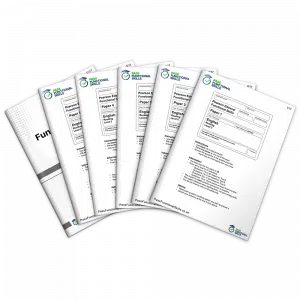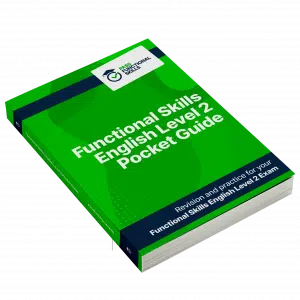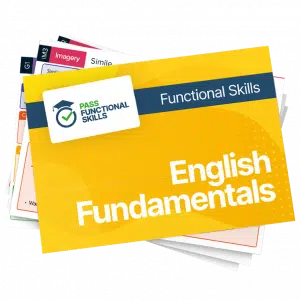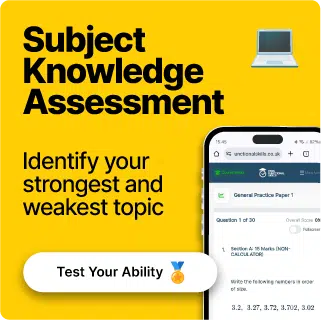Writing: Perfecting your Punctuation
Perfecting your Punctuation
You need to be comfortable with using basic punctuation such as…
- Capital letters
- Full stops
- Question marks
- Exclamation marks
- Commas
- Apostrophes
- Quotation marks
- Colons
Make sure you are happy with the following topics before continuing:
Starting a Sentence
Every sentence needs to start with a capital letter.
However, there are certain words which can have a capital letter in the middle of sentences.
This includes:
Names of people and places
Days of the week
Months of the year
The pronoun ‘I‘


For Example:
‘The swimming pool is closed in winter’
‘I would like to go to Spain in the summer’
Follow Our Socials
Our Facebook page can put you in touch with other students of your course for revision and community support. Alternatively, you can find us on Instagram or TikTok where we're always sharing revision tips for all our courses.
Ending a Sentence
Sentences can end with a:
Full stop – to show the sentence has ended
Exclamation mark – used to emphasise the sentence
Question mark – used when asking a question.


For Example:
‘The boy was hungry. He ate his lunch.‘
The full stops show that both of the sentences are finished.
‘I saw that film. It was incredible!‘
The exclamation mark add more emphasis to show how ‘incredible’ the film was.
‘Where is it from?‘
The question mark shows that a question has been asked.
Commas
Commas help to split up the information in a sentence so that it is easier to follow.
For Example:
‘I went to the shopping centre and bought a book, a coat and a bottle of water.‘
In the above sentence, notice the use of commas to split the items up.
A simple ‘and‘ will do before introducing the last item!
Commas can also join two sentences together with the use of a connective.
The most common connectives are ‘and’, ‘but’ and ‘so’.
For Example:
‘I wanted to go to the park, but it was raining.‘
The comma and connective are added to join the phrases together to make a bigger sentence.
Notes:
Remember the perfect sentence length – don’t go over the top with commas!
Extra information can be contained within commas.
However, this extra information is not necessary for the sentence to make sense.
For Example:
‘The man, who was bald, complained to the manager.‘
If ‘who was bald’ is taken out, the sentence is still grammatical and makes perfect sense.


Apostrophes
Apostrophes are used in contractions to highlight missing letters.
For Example:
‘I don’t like mushrooms.‘
The apostrophe in ‘don’t’ is a placeholder for the missing letter ‘o’ for ‘not’.
Apostrophes are also used to express possession.
For Example:
‘It was Jack’s ball.‘
The apostrophe is used to show that the ball belonged to Jack.
For plurals, when the noun ends in a ‘s’, just add an apostrophe to the end of the word such as:
For Example:
‘No, it was Lucas’ ball.‘
Here, the apostrophe just means ‘it is’, referring to who possesses the ball.


Quotation Marks
Quotation marks go around direct speech.
For Example:
If you wanted to ask someone if they wanted to play football later, the example on the right is how you would ask.
This is in quotation marks because every word is recorded.
Things to Remember:
- Speech which is inside quotation marks always starts with a capital letter.
- If the sentence ends once the quoted speech is finished, remember to put either a full stop, an exclamation mark or a question mark within the last quotation mark.
- If the sentence carries on after the the quoted speech is finished, remember to put a comma after the last quotation mark.
Colons
Colons are used to introduce more information, normally when listing, or to explain the main sentence.
For Example:
‘We’ve got two options: we can either go out or stay at home.‘
The use of the colon explains the two options available.
The information that comes after the colon is normally always a more specific explanation of the information that comes before the colon.
Additional Resources
Exam Tips Cheat Sheet
FS Level 2Specification Points Covered
EL3.13 – Use a range of punctuation correctly (e.g. full stops, capital letters, question and exclamation marks)
L1.19 – Use a range of punctuation correctly (e.g. full stops, question marks, exclamation marks, commas, possessive apostrophes)
L2.20 – Punctuate writing correctly using a wide range of punctuation markers (e.g. colons, commas, inverted commas, apostrophes and quotation marks)
L2.25 – Organise writing for different purposes using appropriate format and structure (e.g. standard templates, paragraphs, bullet points, tables)
L2.28 – Construct complex sentences consistently and accurately, using paragraphs where appropriate
Writing: Perfecting your Punctuation Worksheet and Example Questions
Writing: Perfecting Your Punctuation L2
FS Level 2NewOfficial PFSWriting: Perfecting your Punctuation L1
FS Level 1NewOfficial PFSRevision Products

Functional Skills English Level 2 Practice Papers
This comprehensive set of 10 Functional Skills English Level 2 Practice Papers (5 reading papers + 5 writing) is a great way to revise for your upcoming reading and writing exams. These papers have been specifically tailored to match the structure, format and question types used by each of the main exam boards for functional skills English.

Functional Skills English Level 2 Book
Revise and practice for your functional skills English level 2 exam. All topics covered in this compact functional skills English level 2 book.

Functional Skills English Level 2 Revision Cards
Revise for functional skills English level 2, with these English level 2 fundamentals revision cards. Covering the building blocks of the essential areas of the level 2 exam.









